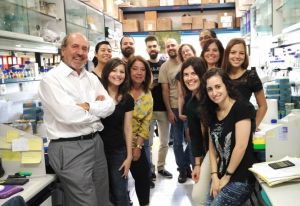El consorcio británico para una vacuna contra el VIH (UK HVC), con participación del Centro Nacional de Biotecnología del CSIC (CNB-CSIC), ha llevado a cabo en el Reino Unido el primer ensayo clínico fase 1 con 40 voluntarios sanos. El producto testado está basado en una combinación de componentes vacunales (ADN, MVA y proteína) contra el VIH subtipo C, el más prevalente en África y el continente asiático. El objetivo principal del ensayo ha sido comparar la seguridad e inmunogenicidad de diferentes procedimientos de vacunación.
El análisis de los resultados indica que la vacunación es más efectiva cuando se administran los distintos componentes de manera secuencial e independiente. Este estudio profiláctico abre las puertas al desarrollo de nuevos métodos de vacunación que induzcan la producción de anticuerpos neutralizantes de amplio espectro de acción frente al VIH.
La vacuna analizada en este ensayo cuenta con componentes de ADN, MVA y proteína, para cuatro antígenos del virus: Env, Gag, Pol y Nef. El componente MVA-C está basado en el virus atenuado de vaccinia, estirpe MVA, y ha sido generado por el grupo del investigador Mariano Esteban en el CNB-CSIC.
En este ensayo clínico se evaluaron dos métodos de vacunación distintos. Por un lado, un grupo de 20 individuos recibió por vía intramuscular tres dosis del vector ADN (semanas 0, 4 y 8) seguido por dos dosis del vector MVA-C junto con la proteína gp140 (semanas 16 y 20). El segundo grupo recibió tres dosis de ADN (semanas 0, 4, 8), seguido de dos dosis de MVA-C (semanas 16 y 20), y finalmente dos dosis de proteína gp140 (semanas 24 y 28).
El seguimiento de los voluntarios durante 40 semanas reveló la seguridad del proceso de vacunación. Los datos inmunológicos obtenidos con muestras de sangre periférica recogida a distintos tiempos después del tratamiento demostraron que el 100% de los voluntarios producía anticuerpos específicos frente a la proteína gp140. Los individuos que recibieron la dosis de proteína de manera independiente tras la administración de MVA-C presentaron una mejor producción de estos anticuerpos. Por otro lado, las respuestas celulares de activación de linfocitos T CD4+ fueron semejantes en ambos procesos de vacunación.
El estudio indica que mediante la vacunación combinada con ADN, MVA y proteína, se incrementa considerablemente la producción de anticuerpos neutralizantes y de alta especificidad frente a la proteína Env, y se activan linfocitos T CD4 claves en el control de la infección por VIH. Los resultados del ensayo han sido publicados en la revista Frontiers in Immunology.
- Joseph S, Quinn K, Greenwood A, Cope AV, McKay PF, Hayes PJ, Kopycinski JT, Gilmour J, Miller AN, Geldmacher C, Nadai Y, Ahmed MI, Montefiori DC, Dally L, Bouliotis G, Lewis DJ, Tatoud R, Wagner R, Esteban M, Shattock RJ, McCormack S, Weber J. A Comparative Phase I Study of Combination, Homologous Subtype-C DNA, MVA, and Env gp140 Protein/Adjuvant HIV Vaccines in Two Immunization Regimes. Front Immunol. 2017 Feb 22;8:149. doi: 10.3389/fimmu.2017.00149.






